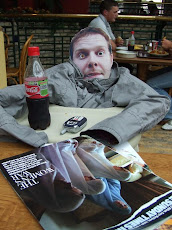
BERLIN (AFP) - The world's only recipient of two full arms in a transplant appeared in public Wednesday to talk about the success of the procedure, calling the feeling of being whole again "indescribable".
Karl Merk, a dairy farmer, gave a press conference with his doctors at the teaching hospital of the Technical University in the southern German city of Munich, where he underwent the transplant managed by a 40-strong medical team.
Six years ago a work accident had led to the amputation of both his arms.
"The feeling is indescribable," Merk, 54, said as he showed off the new limbs, which are being supported by a special "corset" while the healing continues. "Every day I gain more mobility."
Since the amputation, Merk was reliant on round-the-clock care. Two attempts to use prostheses failed.
Discouraged, Merk said he had heard about advances in transplant science on television and sought advice at the university's Rechts der Isar Clinic. Then the search for a donor began.
"It was hard -- I waited by the phone and every time it rang I thought 'the time has come.' And after three months it did," he said in a thick Bavarian dialect.
He said he most looked forward to being able to eventually feed and dress himself "and cruise around a little on my rollerblades".
The medical team said hand and lower arm transplants were still rare and that the Munich operation, by attaching an elbow joint as well as an upper arm, posed a greater challenge for the immune and circulatory systems.
"Never before was such a large amount of foreign tissue transplanted to a person," Merk's doctors said in a statement on the 15-hour surgery.
Doctors have been closely monitoring Merk's progress as he undergoes physical therapy as well as psychological counselling in the aftermath of the gruelling procedure -- a world first -- which was conducted July 25 and 26.
Five teams working in two operating theatres gathered at 10:00 pm the night of the operation, one on each side of the patient and the donor, who had died only hours before. A fifth group removed a leg vein from the donor.
The first step was to expose the muscle, nerves and blood vessels to be connected. Before the bones of the donor could be cut, blood vessels in his arms were filled with a cooled preservation solution.
Both the donor's arms were then removed exactly at the point matching Merk's arm stumps. First the bones were joined, then arteries and veins to ensure blood circulation as quickly as possible.
The surgeons attached the muscles and tendons, then the nerves and finally the skin.
The doctors said there had been "no sign" that Merk's body was rejecting the foreign tissue, as was feared before the procedure, and added that his scars were healing well.
They said their main focus now was to ensure the regeneration of Merk's nerves and to prevent degeneration of his muscles until he has real mobility, which could take up to two years.
For now, Merk can only feel "tingling" in the arms.
The head of the transplant team, Christoph Hoehnke, had told reporters in August after the operation that he was deeply moved when Merk's wife went to his bedside and instinctively reached for his hands.
"They look just like they used to," she said, according to Hoehnke.
Hoehnke said Wednesday he hoped to be able to send Merk back to his dairy farm in four to six weeks.
"I am confident our patient will be able to fulfil one of his biggest wishes one day and drink a glass of milk with his own hands," he said.
Merk said his years of total helplessness had taught him to take the long view in life.
"After six years without arms nothing fazes you," he said.
Karl Merk, a dairy farmer, gave a press conference with his doctors at the teaching hospital of the Technical University in the southern German city of Munich, where he underwent the transplant managed by a 40-strong medical team.
Six years ago a work accident had led to the amputation of both his arms.
"The feeling is indescribable," Merk, 54, said as he showed off the new limbs, which are being supported by a special "corset" while the healing continues. "Every day I gain more mobility."
Since the amputation, Merk was reliant on round-the-clock care. Two attempts to use prostheses failed.
Discouraged, Merk said he had heard about advances in transplant science on television and sought advice at the university's Rechts der Isar Clinic. Then the search for a donor began.
"It was hard -- I waited by the phone and every time it rang I thought 'the time has come.' And after three months it did," he said in a thick Bavarian dialect.
He said he most looked forward to being able to eventually feed and dress himself "and cruise around a little on my rollerblades".
The medical team said hand and lower arm transplants were still rare and that the Munich operation, by attaching an elbow joint as well as an upper arm, posed a greater challenge for the immune and circulatory systems.
"Never before was such a large amount of foreign tissue transplanted to a person," Merk's doctors said in a statement on the 15-hour surgery.
Doctors have been closely monitoring Merk's progress as he undergoes physical therapy as well as psychological counselling in the aftermath of the gruelling procedure -- a world first -- which was conducted July 25 and 26.
Five teams working in two operating theatres gathered at 10:00 pm the night of the operation, one on each side of the patient and the donor, who had died only hours before. A fifth group removed a leg vein from the donor.
The first step was to expose the muscle, nerves and blood vessels to be connected. Before the bones of the donor could be cut, blood vessels in his arms were filled with a cooled preservation solution.
Both the donor's arms were then removed exactly at the point matching Merk's arm stumps. First the bones were joined, then arteries and veins to ensure blood circulation as quickly as possible.
The surgeons attached the muscles and tendons, then the nerves and finally the skin.
The doctors said there had been "no sign" that Merk's body was rejecting the foreign tissue, as was feared before the procedure, and added that his scars were healing well.
They said their main focus now was to ensure the regeneration of Merk's nerves and to prevent degeneration of his muscles until he has real mobility, which could take up to two years.
For now, Merk can only feel "tingling" in the arms.
The head of the transplant team, Christoph Hoehnke, had told reporters in August after the operation that he was deeply moved when Merk's wife went to his bedside and instinctively reached for his hands.
"They look just like they used to," she said, according to Hoehnke.
Hoehnke said Wednesday he hoped to be able to send Merk back to his dairy farm in four to six weeks.
"I am confident our patient will be able to fulfil one of his biggest wishes one day and drink a glass of milk with his own hands," he said.
Merk said his years of total helplessness had taught him to take the long view in life.
"After six years without arms nothing fazes you," he said.





0 comments:
Post a Comment